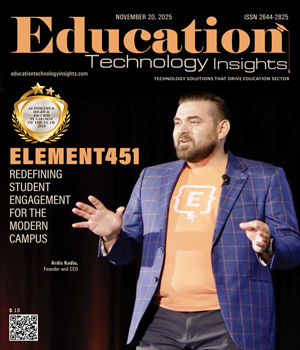THANK YOU FOR SUBSCRIBING
Be first to read the latest tech news, Industry Leader's Insights, and CIO interviews of medium and large enterprises exclusively from Education Technology Insights
Unlocking Potential: How Equitable Technology Transforms Learning
Jason Rubo, Director of Technology & Digital Learning, Verona Area School District
 Jason Rubo, Director of Technology & Digital Learning, Verona Area School District
Jason Rubo, Director of Technology & Digital Learning, Verona Area School DistrictSociety has been dealing with the digital divide since the introduction of modern technology in the late 20th century. Schools with resources began to build computer labs filled with Macintosh Classic PCs. Students would learn to type and, if they finished their typing assignment early, try to survive the Oregon Trail. Fast forward to today, where we have so many different personal devices, from PCs to laptops to Chromebooks, tablets, smart watches, and more. Most schools, regardless of socioeconomic status, have moved from a few carts to be checked out for special case scenarios to providing 1:1 devices for all students.
However, the prices of technological devices were still out of reach for many families. A lack of internet access at home could make a school-issued device nothing more than an expensive paperweight. This became more of a problem as many curriculum companies moved to more digital approaches to their materials, with some families having to find a public place in order to connect to WIFI to get work
done after school hours, or not being able to complete it at all. Schools were at a crossroads of wanting to provide these digital opportunities after school hours for all students, but not having the budget to do so.
When I came into the role as the Director of Technology & Digital Learning two years ago, I tried to approach every decision through an equity lens. I made changes to our policies that would allow all elementary students, who kept devices at school, the option to fill out an opt-in form that would allow them to take their device home with them every night if that was the only access they had. I also reached out to families with different opportunities that were available with local internet service providers for low-cost (sometimes free) home internet. I reached out to those who did not have any form of internet access at home and provided a hotspot to them so they were able to continue their learning at home.
"Prioritizing equitable access to technology is a stance that aligns with my personal philosophy"
I have been very vocal within the entire state of Wisconsin on the topic of artificial intelligence and how we can help bridge opportunity gaps that may occur when students are not with us at school. Presenting on multiple occasions for the Wisconsin Association of School District Administrators and The Principal’s Center, I advocate for safe and responsible ways for students to use AI technology at home with a walled-in garden approach with chatbots. Our team has trained countless educators, from teachers to building/ district leaders, about how they can use different applications to create chatbots that can act as tutors when the student
is at home and might have a question, or prepare them for the ACT/SAT. Our approach is always one that protects student data, using only AI-driven systems that do not collect student data and have signed our district’s data privacy agreement. AI technology use is still in its infancy within the EdTech world, but I am excited to see where it goes in the upcoming years.
Equitable access to technology resources is what our school district embraces. Prioritizing equitable access to technology is a stance that aligns with my personal philosophy. This approach requires leadership moves that build a districtwide culture of technology access for strategic budgeting and careful planning for professional development, but it is one of the most important parts of my job as the Director of Technology & Digital Learning.
Read Also
Designing Engagement That Lasts
Digital Creativity as a Catalyst for Deeper Learning
Protecting Precious Cargo: A Comprehensive Look at School Bus Safety
Student Employees: Your Next IT Investment
How Simmons University Is Reinventing itself and Making History With a Concentration In Women's Sports Management & Leadership
From Access to Belonging: Building a New Blueprint for Engagement and Equity

I agree We use cookies on this website to enhance your user experience. By clicking any link on this page you are giving your consent for us to set cookies. More info













